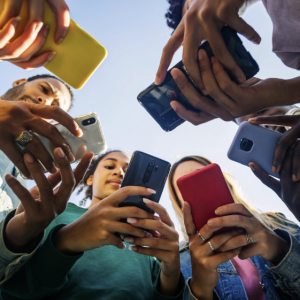
Social Media and the Illusion of Perfection
Social Media and the Illusion of Perfection
MINH HUNG TRAN
Have you ever scrolled through your Instagram and see everyone else has a perfect life? At that moment, the only question pops up in your mind is am I not enough? Am I loser for not having the same life as them? From those flawless selfies to aesthetic morning routines and dream vacations, social media often presents a world a perfection of life. However, behind the carefully selected posts, edited photos, and polished videos lies an uncomfortable truth: Most of them are ideal as what we see – It is a highlight reel. The illusion of perfection created on social media affects how people, especially youth around the globe, see themselves and others. It has a significant consequence for mental health and self-worth.
With over 5 billion social media users globally, platforms like Instagram, TikTok, and Snapchat have become central means to how people connect, express themselves, and even build careers. These platforms flourish on visual contents such as images and videos which are easy to consume and even easier to compare. The problem arises when users, consciously or not, start to alter their lives to match an ideal model that often is not real. As social media is public, people tend to post their happiest moments, best outfits, most exciting travels but rarely their struggles, insecurities, or everyday boredom. This creates a distorted reality where it seems like someone around you is living a better life, happier, and more successful.
Impact of Social Media Illusion:
The impact of this illusion is global and noticeably harmful. Various international studies have shown that social media use is connected to higher rates of anxiety, depression, and loneliness, especially among the teenagers and young adults. A major reason is social comparison. From seeing others constantly succeed, smile, or look perfect, many users develop the feelings of jealousy, inadequate and left behind. They even try to carefully stage or photoshop their photos to make they feel satisfied online. This phenomenon is often called “Compare and Despair” and it has mentally trapped millions of youngsters worldwide.
Body image is another major concern. Social media promotes unrealistic beauty standards, fueled by filters, retouching apps, and sometimes even AI-generated faces and bodies that most people cannot reach it. Across continents, we see the same trends; girls and boys feeling pressured to look “Instagram worthy”, which leads to a rise in body dissatisfaction, eating disorders, and even cosmetic surgery among teens. These standards are also shaped by cultural expectations. In some countries, lighter skin or thinner bodies are idealized; in others, it might be curves or height. But the pressure to meet those criteria is shared worldwide.
been relied on the likes, shares, comments, and follower counts. This creates a dopamine loop, where users become addicted to posting and receiving feedback, persistently chasing the next viral moment to be seen and valued.
How young people respond to this problem?
In response to this problem, around the world, young people are waking up to the illusion and starting to push back. Movements with hashtag like #NoFilter, #RealMe, and #SelfLove are gaining momentum, promoting authenticity, and self-acceptance. Some influencers and celebrities have begun posting unedited photos, stop using toxic beauty products, or openly talking about their struggles with mental health. Schools and organizations are also start promoting digital literacy, helping young people think critically and understand thoroughly about the content they consume and create.
Social media is just a tool, and it is how we use it that matters. When used it mindfully, social media can play a role as an inspiring, connecting, and empowering device. We must always remember that perfection online is just a performance. As global youth, we have power to shift the narrative by choosing honesty over appearance, connection over comparison. We, together, can create a digital world that reflects real life and inspire others with our true values.